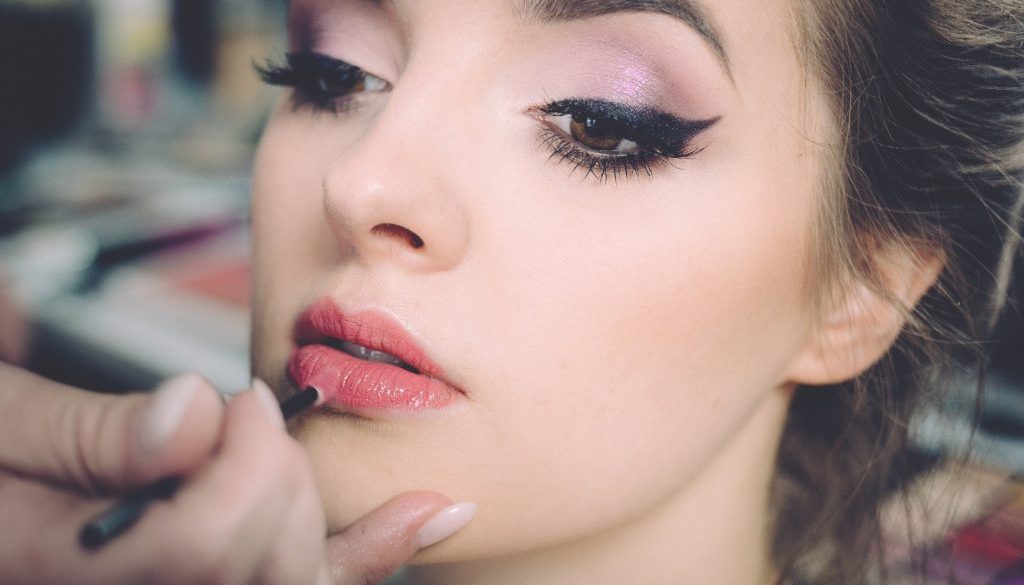Too Much Makeup: The Psychology of Cosmetics
Psychology of Attraction
Attraction is how much we like someone or something. There are a few factors that contribute to attraction, including physical attractiveness, proximity, reciprocity, similarity, and physical environment. Physical attraction has to do with how much we like how someone looks.
Numerous psychology studies about attraction have attempted to explain what makes someone physically attractive. Research indicates that symmetrical faces are considered more attractive than non-symmetrical faces. Evolutionary psychology asserts that female faces are considered more attractive when they look youthful. This generally includes large eyes and plump lips.

Why do Girls Wear Makeup?
Many girls and women wear makeup because they think it will make them more attractive. This belief is perpetuated by cosmetics companies which promise to do exactly what. To some extent it is true, makeup can do the very things that we think makes people more physically attractive: it can enhance facial symmetry and make female faces look more youthful. It enhances facial symmetry by allowing people to do things like erase blemishes and revamp lip lines. Make up might make faces appear more youthful by making the eyes look more dramatic and larger, adding gloss to the lips to make them look larger, and evening out skin tone or erasing dark marks. Assuming makeup has these abilities, does it really achieve the goal of making faces more attractive?
Too Much Makeup
Psychology research tells us that there is such a thing as too much makeup! A study conducted by Jones, Kramer & Ward in 2013 looked at the relationship between cosmetics and attractiveness as well as participants’ perceptions about attractiveness.
The Procedure
Women were asked to come into a psychology lab and first remove all makeup (no makeup condition). Then, they were asked to apply makeup as they normally would (moderate makeup condition). Finally, researchers asked them to apply makeup like they usually would for a night out (heavy makeup condition). Pictures were taken of the participants at each stage. Next, the images were randomly shown to both male and female observers. The observers were asked to do three things:
- Rate how attractive they found the photo
- Rate how attractive they thought women would find the photo
- Rate how attractive they thought men would find the photo

Results
Both men and women preferred the photos where women were wearing a moderate amount of makeup. Both genders also thought that women were less attractive when they were wearing makeup for a night out. Additionally, results revealed that women preferred slightly more makeup than men did.
However, the really interesting results came when they analyzed the different projections. Women and men both thought that other people would prefer more makeup than they themselves did. However, they were wrong. Most people found the same “moderate” amount makeup most attractive.
The women in the photographs were asked to rate how attractive they thought they were before and after they applied makeup. They overwhelmingly rated themselves as more attractive when they were wearing heavy makeup. This tells us that even though others don’t find it attractive when we overdo it on the makeup, we feel more attractive.
Implications
The results from this study indicate that a moderate amount of makeup might actually increase attractiveness, but too much makeup is not attractive. The findings also point to our warped perceptions of attractiveness. What we find attractive about ourselves may not be in line with what other people find attractive.
Women think that others will find them more attractive when they were wearing lots of makeup, but this isn’t true. We can try to figure out why this is the case by looking at evolutionary psychology. From this standpoint, there could be an adaptive value to makeup. Perhaps makeup has become such a huge industry just because it makes women feel more attractive. It would stand to reason that having this confidence boost could be helpful in finding a mate.
From an evolutionary standpoint, it makes sense that women would want to alter their appearance to be more youthful and attractive. Doing so could help an average looking woman compete with a youthful looking woman. It appears that this is possible because small amounts makeup really does dupe people. However, women found themselves most attractive when they were wearing heavy makeup. If we continue from an evolutionary standpoint, this is actually maladaptive. Neither men nor women found others more attractive when they were wearing too much makeup.
Makeup In Pop Culture
So, if other people don’t actually think heavy makeup looks good, why do we? It could be because popular culture constantly depicts women who are wearing very heavy makeup. This could lead people to believe in false social norms about makeup and therefore misjudge other people’s perceptions about cosmetics.
Next time you open Instagram and start watching a makeup tutorial, allow yourself to question what you are watching. Many of these videos exist to sell you cosmetic products and could actually have a negative impact on your self-esteem. If you think you only look beautiful with a face full of makeup, think again.

